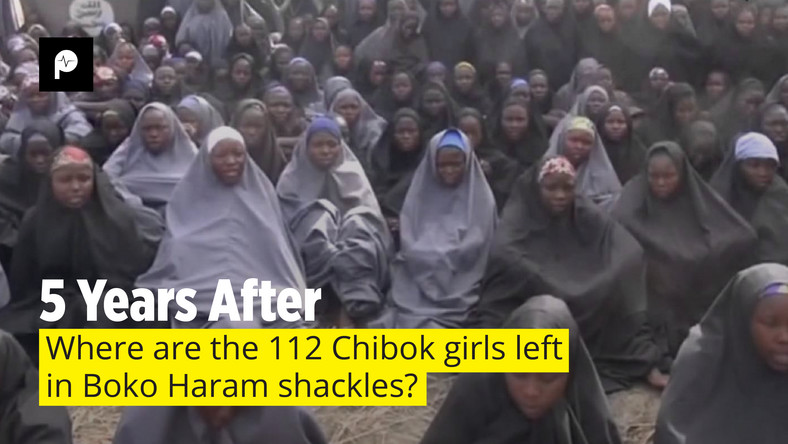
276 Chibok schoolgirls were abducted by Boko Haram
5 years after, where are the 112 Chibok girls left in Boko Haram shackles?
And this is saying a lot considering that, just a few weeks prior, it had also invaded the Federal Government College of Buni Yadi, Yobe State, and brutally slaughtered fifty-nine students, all boys.
Since 2014, the Chibok abduction saga has gone through more twists and turns than can be fitted into a feature-length movie, a movie that should definitely turn the stomach of the audience.
It has involved escapes, rescues, prisoner swaps and ransom payments, conspiracy theories, alleged rape, indoctrination, new babies, dead parents, and a bagful of grand unfulfilled promises.
However, despite how long it has dragged, five years today, a total of 112 girls remain unaccounted for.
The girls were abducted by the Abubakar Shekau-led Boko Haram faction that was at the height of its powers in 2014 [AFP]
While 57 of the girls escaped before Boko Haram could transport them to their base, then deep in the heart of Sambisa Forest, four others were rescued or escaped after two years, and a total of 103 were released after an agreement with the government. The deal involved a ransom payment and the release of five Boko Haram commanders.
That has left 112 girls still caught in the claws of an Abubakar Shekau-led Boko Haram faction whose powers has been on the wane in the past year while another faction has grown in wings.
How have 112 girls, kidnapped as teenagers, survived five years in the cold, on the very fringes of civilisation, with men who abducted them and stripped away their liberties?
Distressing reports abound about girls fate
Salomi Pogu, who was found by troops in Gwoza, Borno in January 2018, is the last Chibok girl to have escaped from Boko Haram. Since her return, not much has been heard about the remaining 112 girls.
Salomi Pogu (pictured) was intercepted by military troops in Pulka, a Borno village in January 2018. She was found in the company of her child and another young girl, Jamila Adams [Today]
Their continued stay in captivity has given rise to many theories about their fate with some of them reported, several times, to have died as far back as 2014.
For instance, a week after the abduction, a team of vigilantes claimed that four of the girls were killed and hastily buried for being ‘stubborn and uncooperative’ while they were camped near the village of Ba’ale, an hour’s drive from Chibok.
This claim was never officially acknowledged by the government but Amina Ali Nkeki, who was found by a patrol group in May 2016, disclosed that six of the girls were already dead.
Amina Ali Nkeki was found by a Civilian Joint Task Force (CJTF) patrol group in May 2016 along with her 4-month-old child named Safiya and a Boko Haram member, Mohammed Hayatu, who described himself as her husband [Presidency]
In a video released by Boko Haram in August 2016, a masked terrorist claimed that some girls died due to air strikes launched by the Nigeria Air Force (NAF) in its bid to hurt the militants. He disclosed that some of the girls also sustained life-threatening injuries and that 40 had been married off to militants.
A December 2017 report by the Wall Street Journal also claimed that 13 of the schoolgirls had died from a range of causes during the time spent in captivity.
“Some were felled by malaria, hunger or a snake bite. The majority died in airstrikes. Among those forcibly married to fighters, at least two died in childbirth,” a source said.
Last year, Ahmad Salkida, a journalist who has accurately reported on a lot of Boko Haram activities, sensationally announced that only 30 of the Chibok girls were still alive according to information he claimed to have received from Boko Haram’s leadership.
He said many of the girls died as a result of crossfire and bombardments of the security forces intent on rescuing them from their captors.
According to him, the 30 girls left alive were split between three different Boko Haram cells with some of them imbibing the doctrines and teachings of the sect and committed to not returning home to their families.
This is consistent with a video that was released by Boko Haram in January 2018 in which some of the Chibok girls said they were never returning home to their parents.
In the 20-minute video, where at least 14 of the girls were filmed, the one that spoke also revealed that they have all been married off to fighters.